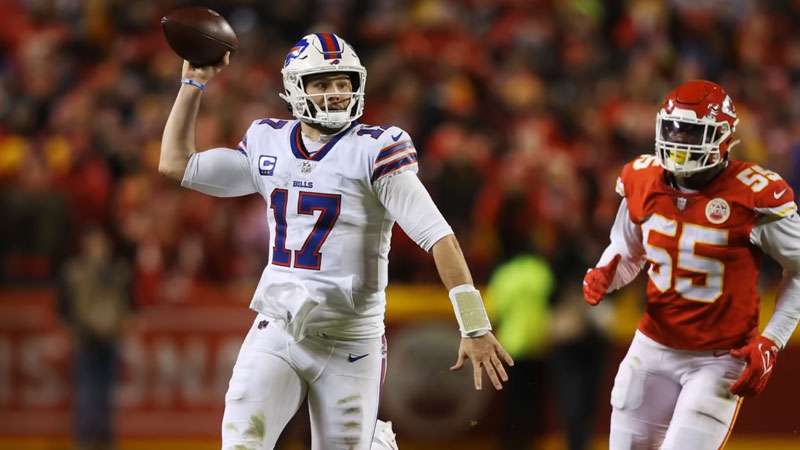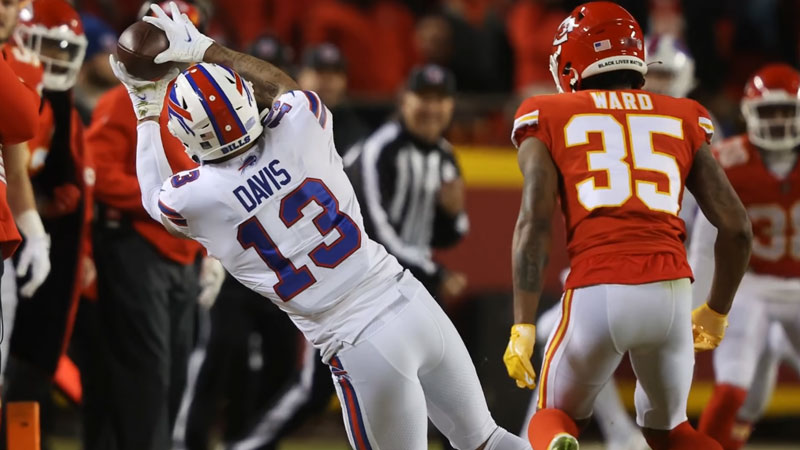When it comes to the high-stakes drama of NFL football, few moments can rival the intensity of overtime. As the clock ticks down at the end of regulation time, teams and fans alike hold their breath, knowing that the next play could determine victory or defeat.
The NFL’s overtime rules bring an added layer of excitement, strategy, and complexity to the game.
In this post, we delve into the intricacies of NFL football overtime rules, addressing five frequently asked questions that shed light on how these rules impact the course of the game and influence its outcome.
Regular Overtime Rules in the NFL
In the National Football League (NFL), regular overtime rules come into play when the score is tied at the end of regulation play. These rules are designed to determine a winner in a timely manner while providing both teams with a fair opportunity to possess the ball and potentially score.
The following is an overview of the regular overtime rules in the NFL:
Coin Toss and Possession
At the end of regulation, a coin toss is conducted to determine which team will possess the ball first in overtime. The visiting team captain calls the toss. The winner of the coin toss gets to choose whether they want to kick off or receive the ball.
10-Minute Overtime Period
Overtime consists of a single 10-minute period. There is a three-minute intermission between the end of regulation and the start of overtime.
Equal Possession Opportunity
Each team is guaranteed an opportunity to possess the ball, unless the team that possesses the ball first scores a touchdown on their opening possession. If the opening possession results in a field goal or no score, the opposing team gets the opportunity to possess the ball.
Sudden Death Play
The overtime period follows a sudden death format. This means that the game ends as soon as either team scores, whether it’s through a safety, field goal, or touchdown. The first team to score wins the game.
Timeouts
Each team is granted two timeouts during the overtime period. These timeouts can be used for various strategic purposes, such as stopping the clock or making adjustments to the game plan.
No Point After Try
If the game ends on a touchdown scored during overtime, the point after try (PAT) is not attempted. The touchdown itself is sufficient to determine the winner of the game.
Tie if the Score Remains Tied
If the 10-minute overtime period expires and the score is still tied, the game will be recorded as a tie. Unlike the regular season, ties are generally not acceptable outcomes in the NFL, but they are possible in time.
Instant Replay and Challenges
Unlike the regular season, there are no coach’s challenges or instant replay reviews initiated by coaches during overtime. All reviews are initiated by the replay official to ensure fairness and accuracy in critical game-deciding moments.
The regular overtime rules in the NFL aim to balance the need for a timely resolution with the principle of fairness. The coin toss, equal possession opportunity, and sudden death format all contribute to an exciting and suspenseful overtime period.
If the game remains tied after overtime, it results in a tie, which is a rare outcome in the NFL due to the league’s emphasis on determining a clear winner.
Post-season Overtime Rules in the NFL

In the National Football League (NFL), the rules for overtime games during the postseason are distinct from those of regular-season games. The primary objective of these rules is to ensure that a clear winner is determined, avoiding ties that might occur in the regular season.
The following outlines the key points of the NFL’s postseason overtime rules:
No Ties Allowed
Unlike regular-season games, where a game can end in a tie if neither team secures a victory within the designated overtime period, postseason games must produce a definite winner.
This means that if the score remains tied at the end of an overtime period during the playoffs, the game will continue with additional overtime periods until a victor is determined.
Continuous Overtime
Teams will continue to play additional overtime periods until a winner is decided. There are no restrictions on the number of overtime periods that can be played in the pursuit of a clear outcome.
Intermissions
Between each overtime period, there will be a two-minute intermission. This brief break allows players to rest, regroup, and strategize for the upcoming overtime period.
However, unlike regular games or halftime intermissions, these intermissions are shorter and aim to maintain the intensity of the game.
Captain’s Choice
The captain who lost the coin toss in the initial overtime period will have the choice of either possessing the ball or selecting which goal their team will defend. This decision grants them a strategic advantage in the overtime period.
Team Possession
Just as in regular-season overtime rules, each team will have an opportunity to possess the ball in the overtime period. This ensures fairness and equal chances for both teams to make an impact on the game’s outcome.
Timeouts
Each team is granted three timeouts during each half of the overtime period. This provision remains consistent with regular-season rules and provides teams with the opportunity to strategize, rest, and make necessary adjustments.
Timing Rules
The timing rules applicable at the end of the second and fourth regulation periods also apply to the end of the second or fourth overtime period.
This maintains uniformity in the game’s pacing and ensures that both teams are treated fairly in terms of time management.
Final Coin Toss
If the game remains tied at the end of the fourth overtime period, there will be another coin toss to determine the initial possession for the next overtime period. Play will continue until a winner is finally declared.
The NFL’s postseason overtime rules aim to provide a definitive winner for playoff games by eliminating the possibility of ties.
Continuous overtime periods, strategic choices by captains, equal opportunities for team possession, and specific timing rules are all employed to create an exciting and fair overtime experience during the playoffs.
NFL Playoff Overtime Rules

Playoff Overtime Rules in the NFL are distinct from regular season overtime rules, and designed to ensure an equitable and decisive conclusion to postseason games.
These rules help maintain the excitement of high-stakes matchups while addressing the need for clear winners.
Coaches’ Challenges and Replay Reviews
Unlike the regular season, coaches are not allowed to challenge any calls during playoff overtime. All replay reviews are initiated solely by the replay official, who will review plays as necessary to ensure accuracy and fairness.
Timeouts
Each team is granted three timeouts for each half of overtime, which translates to two overtime periods. This is an increase from the regular season, where teams receive only two timeouts during overtime.
Intermissions
The break between the end of regulation time and the start of the first overtime period is kept relatively short, lasting no more than three minutes. This ensures a seamless transition between regular time and overtime play.
Additionally, there is a two-minute intermission between each subsequent overtime period, except for the second overtime where there is no halftime intermission.
Third Overtime Period
If the game extends into a third overtime period, a unique situation arises. The captain who lost the coin toss at the beginning of the first overtime will have a significant choice to make.
This captain will decide whether their team will possess the ball first or choose the goal they want to defend. However, if the team that won the initial coin toss opted to defer their choice, this decision will not apply.
Fourth Overtime Period
If the game continues into a fourth overtime period without a winner determined, another coin toss will occur.
This toss will determine which team gains the first possession in the new overtime period, offering them a fresh opportunity to secure victory.
The intention behind these playoff overtime rules is to prevent games from dragging on indefinitely while maintaining a balance between fairness and excitement.
The NFL aims to provide fans with a thrilling postseason experience where games are decided conclusively within a reasonable timeframe.
By introducing a mix of strategic decision-making and athletic prowess, the playoff overtime rules ensure that every team has an equal chance to win and advance in the playoffs.
Essential Facts Regarding Overtime Rules in the NFL
In the NFL, overtime rules play a crucial role in determining the winner of a game when regular time ends in a tie. Several essential facts govern how overtime is conducted, ensuring a fair and decisive outcome for both teams involved:
Coin Toss
Overtime in the NFL starts with a coin toss, similar to the beginning of a regular game. The visiting team’s captain calls the coin toss, and the winner of the toss can choose whether to receive the ball or kick it off. The other option is to choose which end of the field to defend.
The team that loses the coin toss gets the opposite choice. The team that possesses the ball first in overtime is known as the “receiving team.”
Overtime Replay
In playoff games, coaches are not allowed to challenge calls on the field during overtime. Instead, replay reviews are initiated exclusively by the replay official.
This helps ensure accurate and fair decisions, without elongating the overtime period due to challenges.
Two-Minute Warning
Just like in regular game situations, there is a two-minute warning in each overtime period.
This warning indicates that two minutes remain in that period. It gives both teams an opportunity to strategize and make necessary adjustments as the end of the period approaches.
First Possession
The team that possesses the ball first in overtime has a significant advantage. If they score a touchdown on their opening possession, the game ends, and they win.
However, if the opening possession results in a field goal, the other team gets a chance to possess the ball. If the receiving team scores a field goal on their first possession, the game continues, and the other team also gets a possession opportunity.
Penalties
Penalties play a crucial role in overtime. If the team on defense commits a penalty during the first possession of the overtime period that results in a first down for the offensive team, the game continues, and the offensive team retains possession.
However, if the offensive team commits a penalty that would result in a loss of down, the game will still continue, but they will lose the down.
These essential facts ensure that overtime in the NFL is conducted fairly and with clear rules. The coin toss determines initial possession, while the rules around scoring and possession help balance the opportunities for both teams.
The inclusion of replay reviews and the consideration of penalties add layers of strategy and fairness, ensuring that the game’s outcome is decisive and reflective of the teams’ performance on the field.
Impact of Overtime Rules in NFL

The overtime rules in the NFL have a significant impact on the game, shaping the outcome, strategy, and overall experience for players, coaches, and fans. Here are some of the key impacts of these rules:
Decisive Outcomes
The primary purpose of overtime rules is to ensure that games have a clear winner. In the regular season, ties are not desirable, and overtime provides a mechanism to determine a victor.
This is particularly crucial in playoff games, where advancing to the next round is at stake. The rules encourage teams to play aggressively and seek a decisive outcome rather than settling for a draw.
Strategic Decision-Making
The coin toss at the start of overtime introduces a strategic element. The team that wins the toss must decide between receiving the ball first and potentially scoring a game-winning touchdown or field goal, or choosing which end of the field to defend. This decision impacts the overall strategy for the entire overtime period.
Possession Advantage
The team that possesses the ball first in overtime has a significant advantage. Scoring a touchdown on the opening drive immediately ends the game.
This dynamic leads to increased importance on the initial possession and can shape the way teams approach their offensive and defensive strategies.
Pressure on Defense
If the team on defense gives up a touchdown or allows the opposing team to score a field goal on the first possession, the game ends, and they lose.
This creates immense pressure on the defense to perform well right from the start. Conversely, the defense has an opportunity to end the game by creating a turnover or stopping the offense.
Impact on Scoring
Overtime rules can impact how teams approach scoring decisions. When a team is trailing by a few points, they might opt for a field goal to tie the game and extend play.
However, in overtime, scoring a touchdown becomes even more crucial, as it not only gives the team the lead but also ensures a potential game-ending scenario if the opposing team doesn’t respond with a touchdown.
Fairness and Excitement
The overtime rules aim to strike a balance between fairness and excitement. Limiting the game to a single 10-minute period in the regular season and incorporating sudden-death rules in postseason games prevents games from dragging on excessively while maintaining the thrill of overtime scenarios.
Avoiding Exhaustion
To prevent excessive strain on players’ physical and mental well-being, especially during long games, the rules include intermissions between overtime periods. This ensures that players have a chance to rest and recover before continuing to play.
Fan Engagement
Overtime situations often captivate fans’ attention and generate intense excitement. The sudden-death nature of overtime, where a single play can decide the game, keeps fans on the edge of their seats and contributes to the drama and entertainment value of the sport.
The overtime rules in the NFL play a vital role in shaping the course of games and ensuring that a clear winner emerges, while also adding layers of strategy and excitement that enhance the overall viewing experience for fans.
FAQs
What is the purpose of NFL overtime rules?
The primary purpose of NFL overtime rules is to ensure that games have a clear and decisive winner. Overtime eliminates the possibility of ties, which are often unsatisfying outcomes in sports competitions.
Whether in the regular season or playoffs, these rules aim to provide both teams an equal opportunity to secure victory, maintaining the integrity of the game.
How does the coin toss impact overtime?
The coin toss holds immense significance in time. The winner of the toss can choose between receiving the ball or deciding which end of the field to defend.
This decision sets the tone for the entire overtime period, influencing each team’s offensive and defensive strategies.
What is “sudden death” in NFL overtime?
“Sudden death” refers to the scenario where the first team to score during overtime wins the game immediately. If the receiving team scores a touchdown, the game ends; if they kick a field goal, the opposing team gets a chance to respond.
If the initial receiving team scores neither a touchdown nor a field goal, the opposing team has the opportunity to possess the ball and win the game with a score of any kind.
How do penalties impact overtime?
Penalties play a critical role in overtime, especially during the initial possession of each team. If the defensive team commits a penalty that would result in a first down for the offensive team, the offensive team retains possession.
However, if the offensive team commits a penalty that would result in a loss of down, the game continues, but they lose the down.
How do NFL overtime rules differ in the regular season and playoffs?
In the regular season, overtime consists of a single 10-minute period, and if no winner emerges, the game ends in a tie.
However, during the playoffs, the rules are modified to ensure a decisive outcome. Playoff overtime includes multiple periods, each starting with a coin toss until a team emerges as the winner.
Wrapping Up
NFL football overtime rules add an element of unpredictability and exhilaration to the game. The coin toss, sudden-death scenarios, strategic decisions, and the role of penalties all contribute to the high-stakes nature of overtime play.
Whether you’re a die-hard fan or a casual observer, understanding these rules allows you to fully appreciate the intensity and drama that overtime brings to the gridiron.
So, the next time you find yourself on the edge of your seat during overtime, you’ll have a deeper insight into the rules shaping those game-changing moments.







